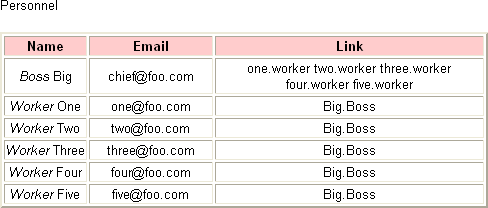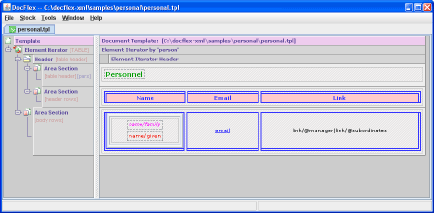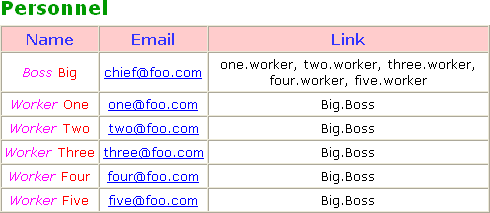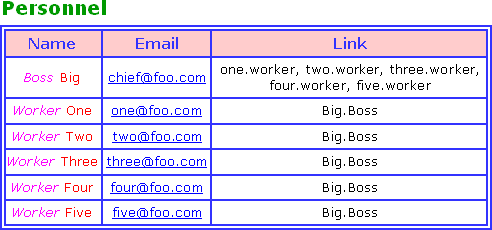FlexDoc/XML - Samples - Alternative to XSLT
This sample demonstrates how FlexDoc/XML can be used as an alternative to a standard XSL Transformation.
1. Sample Data
The sample data are taken from the following XML document:
personal.xml
<?xml version="1.0" encoding="UTF-8"?>
<!DOCTYPE personnel SYSTEM "personal.dtd">
<personnel>
<person id="Big.Boss">
<name>
<family>Boss</family>
<given>Big</given>
</name>
<email>chief@foo.com</email>
<link subordinates="one.worker two.worker three.worker four.worker five.worker"/>
</person>
<person id="one.worker">
<name>
<family>Worker</family>
<given>One</given>
</name>
<email>one@foo.com</email>
<link manager="Big.Boss"/>
</person>
<person id="two.worker">
<name>
<family>Worker</family>
<given>Two</given>
</name>
<email>two@foo.com</email>
<link manager="Big.Boss"/>
</person>
<person id="three.worker">
<name>
<family>Worker</family>
<given>Three</given>
</name>
<email>three@foo.com</email>
<link manager="Big.Boss"/>
</person>
<person id="four.worker">
<name>
<family>Worker</family>
<given>Four</given>
</name>
<email>four@foo.com</email>
<link manager="Big.Boss"/>
</person>
<person id="five.worker">
<name>
<family>Worker</family>
<given>Five</given>
</name>
<email>five@foo.com</email>
<link manager="Big.Boss"/>
</person>
</personnel>
The XML's structure is described by this DTD-file:
personal.dtd
<?xml encoding="UTF-8"?> <!ELEMENT personnel (person)+> <!ELEMENT person (name,email*,url*,link?)> <!ATTLIST person id ID #REQUIRED> <!ATTLIST person note CDATA #IMPLIED> <!ATTLIST person contr (true|false) 'false'> <!ATTLIST person salary CDATA #IMPLIED> <!ELEMENT name ((family,given)|(given,family))> <!ELEMENT family (#PCDATA)> <!ELEMENT given (#PCDATA)> <!ELEMENT email (#PCDATA)> <!ELEMENT url EMPTY> <!ATTLIST url href CDATA 'http://'> <!ELEMENT link EMPTY> <!ATTLIST link manager IDREF #IMPLIED> <!ATTLIST link subordinates IDREFS #IMPLIED>
2. Using XSLT
Here's the XSLT-script defining the transformation:personal.xsl
<?xml version="1.0" encoding="UTF-8"?>
<xsl:stylesheet version="1.0" xmlns:xsl="http://www.w3.org/1999/XSL/Transform">
<xsl:template match="/">
<html>
<p>Personnel</p>
<xsl:element name="table">
<xsl:attribute name="border">2</xsl:attribute>
<tr>
<xsl:attribute name="color">#3333FF</xsl:attribute>
<xsl:attribute name="bgcolor">#FFCCCC</xsl:attribute>
<xsl:attribute name="align">center</xsl:attribute>
<td>
<font name="verdana" size="3">
<b>Name</b>
</font>
</td>
<td>
<font name="verdana" size="3">
<b>Email</b>
</font>
</td>
<td>
<font name="verdana" size="3">
<b>Link</b>
</font>
</td>
</tr>
<xsl:apply-templates/>
</xsl:element>
</html>
</xsl:template>
<xsl:template match="//person">
<xsl:element name="tr">
<xsl:attribute name="align">center</xsl:attribute>
<xsl:element name="td">
<font name="verdana" size="3">
<xsl:attribute name="width">120</xsl:attribute>
<i>
<xsl:value-of select="name/family/text()"/>
<xsl:text disable-output-escaping="yes"> </xsl:text>
</i>
<xsl:value-of select="name/given/text()"/>
</font>
</xsl:element>
<xsl:element name="td">
<xsl:attribute name="width">120</xsl:attribute>
<font name="verdana" size="3">
<xsl:value-of select="email/text()"/>
</font>
</xsl:element>
<xsl:element name="td">
<font color="black" name="verdana" size="3">
<xsl:value-of select="./link/@subordinates"/>
<xsl:value-of select="./link/@manager"/>
</font>
</xsl:element>
</xsl:element>
</xsl:template>
</xsl:stylesheet>
The HTML file produced with that XSLT-script is the following:
3. FlexDoc/XML Alternative
Here is how the corresponding FlexDoc template looks (click on the screenshot to see in full size): Except of a few settings invisible on this screenshot, it is almost all needed to design as a replacement for the XSLT-script above.To learn in every detail how to create and execute this template, please see Creating a Sample Template tutorial.
The XML Type definition prepared for this template consists of just three lines:-
personal.name = Personal personal.dtd.file = %FDH%/samples/personal/personal.dtd personal.dtd.systemID = personal.dtd




